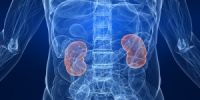Higher All-Cause Mortality Associated with Hyponatremia in Chronic Kidney Disease
Study results show hyponatremia is closely associated with all-cause mortality in patients with chronic kidney disease (CKD), but few previous studies have examined this relationship.

Study results show hyponatremia is closely associated with all-cause mortality in patients with chronic kidney disease (CKD), but few previous studies have examined this relationship.
Diana Chiu, MBChB, a physician with the Salford Vascular Research Group of the Manchester Academic Health Science Centre of the University of Manchester in the United Kingdom, and colleagues reported their findings at Kidney Week 2013, the American Society of Nephrology's annual meeting in Atlanta, GA, on November 9, 2013.
Hyponatremia, one of the most common electrolyte abnormalities found in hospitalized patients, has been linked in previous research with various adverse clinical outcomes including length of hospital stay, gait problems and falls, bone fractures, and rhabdomyolysis. Physiological disturbances in fluid and sodium balance have been identified as part of the normal aging process and accompany many disorders common among aging individuals as their kidney function and ability to maintain homeostasis diminishes. Hyponatremia has also been linked with significantly increased healthcare costs.
Even so, according to the authors, few studies have investigated the association between hyponatremia and all-cause mortality in CKD. To study that relationship, the researchers performed a cross-sectional analysis of data from the Chronic Renal Insufficiency Standards Implementation Study (CRISIS), which contains a collection of DNA samples taken from participants with CKD who are eighteen years of age and older from all ethnicities who are recruited from the Salford Royal Hospital of the Salford Royal NHS Foundation Trust in Salford, United Kingdom. They conducted their prospective observational outcome study in patients with all-cause CKD stages 3-5 who were managed in secondary care.
Hyponatremia was considered to be baseline serum sodium <135mmol/l. From 2,093 patients with an overall mean estimated glomerular filtration rate 33±16 ml/min/1.73m2, there were 1,311 (63%) males, 660 (32%) diabetic patients, 346 (17%) patients with a history of heart failure, and 1,002 (47.9%) patients who were taking diuretics. The overall mean serum sodium was 140±3mmol/l, and 96 (4.6%) patients had hyponatremia (mean 132±2mmol/l, range 125-134mmol/l).
The predictors of all-cause mortality were selected from forward stepwise cox regression, including the potential confounders of age, gender, systolic and diastolic blood pressure, previous myocardial infarction, history of heart failure, smoking status, diuretic use, renin angiotensin blocker use, estimated glomerular filtration rate, albumin and hemoglobin.
The researchers found that, after a mean follow-up of 48±33 months, there were 684 (32.7%) deaths, and in their final cox regression model, hyponatremia was a significant independent predictor of all-cause mortality (Hazard Ratio 1.44, p=0.03).
They concluded that, in patients with CKD, hyponatremia was associated with all-cause mortality, and they recommended further research to explore whether this relationship may be a reflection of the adverse effects of hyponatremia or a surrogate marker of existing comorbidities.